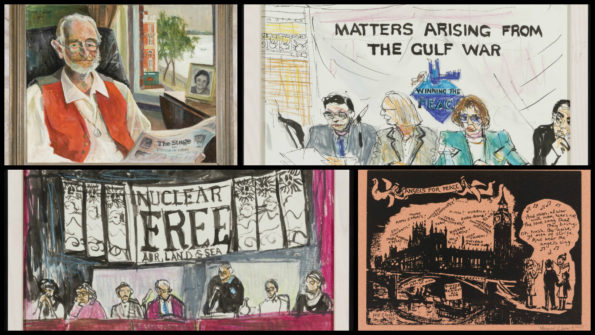Women's Views on News |
| Bristol celebrates forty years of feminism Posted: 29 Jul 2016 06:58 AM PDT
In October ‘Forty Years a Feminist’ at the Bristol Festival of Ideas will commemorate Bristol's feminist activism with a panel discussion, the launch of Miriam David's book ‘Reclaiming Feminism’, and a party to celebrate four decades of achievement. There will also be exhibitions from Feminist Archive South and the University Women's Theatre Collection. The Bristol Women's Centre opened in September 1976 at 44 The Grove. Focus for many feminist campaigns, the Centre offered pregnancy testing, and advice on legal issues, accommodation, contraception, domestic violence and rape. In ‘Reclaiming Feminism‘, Miriam David, Professor Emerita of Sociology of Education at UCL's Institute of Education and a well-known and influential feminist in higher education, celebrates the achievements of international feminists as activists and scholars and illustrates the power of patriarchal social relations and how everyday sexism or misogyny is keenly felt. As a feminist academic activist for over 40 years, she has written on family, gender, education and social policies: most recently ‘Reclaiming Feminism: Challenging Everyday Misogyny’, to give it its full title and ‘A Feminist Manifesto for Education‘. In her review of Reclaiming Femnism, Professor Emma Renold of Cardiff University said: “This book powerfully sets out how reclaiming and reinventing feminist futures continues to matter. It’s a must read for new generations of academic feminists struggling to challenge and change neo-patriarchal structures and practices in education and beyond.” The women on the panel at the Bristol event – Liz Bird, Helen Dunmore, Ellen Malos, Pam Trevithick and Jackie West – represent various campaigns and activities that made up the mid-1970s Bristol Women's Liberation group, and will be chaired by Helen Taylor. Helen Taylor is now Professor Emerita of Literature at the University of Exeter, and Honorary Research Fellow, British Association of American Studies. She was the director of the first 'Sistershow', in Bristol in 1973, and has published widely on women's writing and culture. Liz Bird worked with adults in higher education for over thirty years – latterly at the University of Bristol – teaching cultural studies, women's studies and film. She is currently a printmaker and member of Spike Print Studio. Helen Dunmore is a novelist, poet, short-story and children's writer. Her most recent novel is ‘Exposure‘. She was the inaugural winner of the Orange Prize for Fiction (now the Baileys Prize) and her work has been translated into more than thirty languages. She is a Fellow of the Royal Society of Literature. Ellen Malos was a founder member of the Bristol Women's Liberation Movement after her arrival here in the UK from Australia in 1962. The first Bristol women's centre and refuge was a room in her home. A published author, writing on women's history and feminist thought, Malos co-founded the Gender and Violence Research Centre at Bristol University and was awarded an Honorary Doctorate for her work. Pamela Trevithick was actively involved in the running of Bristol Women's Centre and later focused on setting up Bristol Womankind, where she worked for nearly 10 years with women struggling with mental health issues. She is a member of Bristol Fawcett, has been chair of Bristol Rape Crisis and is currently a retired social worker and Visiting Professor in Social Work at Buckinghamshire New University. Jackie West was a sociologist; working at the University of Bristol. Campaigns for employment equality and reproductive rights inspired her teaching and research. She had particular interests in work, the family and sexuality, was vice chair of the Brook Advisory Centre in Bristol for many years, and has undertaken research for the Health Authority on young people and sexual health. She is currently involved in an EU project on sex work and prostitution policy. The Bristol Festival of Ideas, established in 2004, emerged out of Bristol's bid to be Capital of Culture in 2008, the aim being to get more debate going in the city and in a bid to celebrate the work of great writers, commentators and thinkers in and outside the city. In the past 10 years it has hosted more than 2,000 events. For tickets to ‘Forty Years a Feminist’ click here. |
| You are subscribed to email updates from Women's Views on News. To stop receiving these emails, you may unsubscribe now. | Email delivery powered by Google |
| Google Inc., 1600 Amphitheatre Parkway, Mountain View, CA 94043, United States | |




 casino and Hilton Hotel in Tallin last month but in this edition we have a chance to talk in more detail to Armin Karu. Chairman of the board, and Madis Jaager, CEO, about the development.
casino and Hilton Hotel in Tallin last month but in this edition we have a chance to talk in more detail to Armin Karu. Chairman of the board, and Madis Jaager, CEO, about the development.



